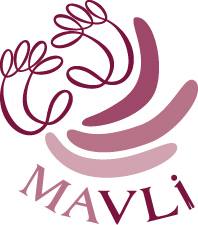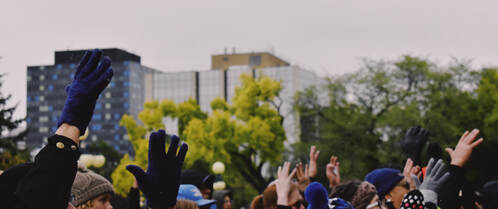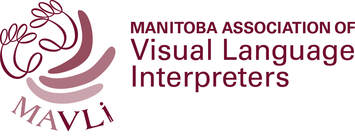Manitoba Association of
Visual Language Interpreters
Established in 1976MAVLI is a non-profit organization responsible for promoting the standardization and high quality of professional services provided by sign language interpreters. MAVLI advocates for a high standard of education in professional interpreter training programs and promotes professional development, knowledge and skills of visual language interpreters.
|
Our MissionTo promote the Visual Language Interpreting profession through ongoing advocacy and education.
Become a MemberMAVLI membership is designed to unite and inform professional sign language interpreters. Our membership works towards promoting and improving the interpreting field by sharing resources, information and opportunities. Become a member to gain access to our Employment Opportunity email distribution list and discounted rates on select MAVLI hosted professional development.
To become a member, email: [email protected] |
Our Code of EthicsMAVLI is an affiliate chapter of the Canadian Association of Sign Language Interpreters (CASLI) formerly known as the Association of Visual Language Interpreters (AVLIC).
"AVLIC expects its members to maintain high standards of professional conduct in their capacity and identity as an interpreter. Members are required to abide by the Code of Ethics and follow the Guidelines for Professional Conduct as a condition of membership in the organization." - CASLI Code of Ethics and Guidelines for Professional Conduct |
We recognize that the Manitoba Association of Visual Language Interpreters is located on Treaty 1 Territory and our members are active on the Territories of Treaty 1, 2, 3, 4 and 5; the original lands of the Anishinaabe, Cree, Oji-Cree, Dakota and Dene peoples, and the homeland of the Metis Nation.
We honour the history and knowledge of the original keepers of this land. We acknowledge the harms caused by colonization and recognize that this harm has influenced our practices as a profession. In our focus on working with members of a marginalized community, the Deaf and Hard of Hearing, we have often neglected the unique experiences of Indigenous peoples. We are dedicated to a spirit of reconciliation and partnership; we commit to learning and growth. We thank those who have taken the time to teach us.
We honour the history and knowledge of the original keepers of this land. We acknowledge the harms caused by colonization and recognize that this harm has influenced our practices as a profession. In our focus on working with members of a marginalized community, the Deaf and Hard of Hearing, we have often neglected the unique experiences of Indigenous peoples. We are dedicated to a spirit of reconciliation and partnership; we commit to learning and growth. We thank those who have taken the time to teach us.



